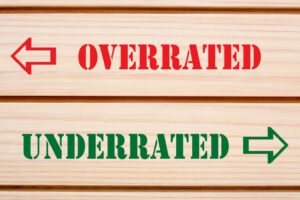When I used to work and was quite busy, I would read The Wall Street Journal every day and listen to NPR on my daily commute. I used to think I was fairly well-informed. Now that I’m retired and my time is virtually unlimited, I can’t be bothered to keep up on the news.
Therefore I was completely surprised when I read in Fortune that on Oct. 31, 2023, the National Association of Realtors (NAR) lost a $1.8 billion lawsuit brought by 500,000 home sellers in Missouri and some border towns. The suit was about whether Realtors artificially inflate their commissions.
After reading a number of articles about the lawsuit I am still unsure what the judgment will actually mean for real estate buyers and sellers going forward.
More: A century-old real estate practice could soon end. Here’s how home sellers and buyers could be affected.
I do know what it will mean for lawyers: they will sue the NAR in other regions. Due to the speed of the American justice system it also will mean we should expect to wait several years for everything to shake out.
Brokers set their own rules
According to Fortune, “The focus of the lawsuits is an NAR rule that requires that home sellers offer to pay the commission for the agent representing the home buyer when they advertise their property on a local Multiple Listing Service (MLS), where a majority of U.S. homes are listed for sale.”
If the outcome of this lawsuit means that the home buyer will be responsible for the remuneration of the buyer’s agent, then this lawsuit may be beneficial to buyers and sellers.
See: Real-estate industry groups were found guilty of inflating commissions. Here’s what that could mean for homeowners.
A report by analysts at the investment bank Keefe, Bruyette & Woods estimated the decision in this lawsuit could cut commissions by 30% from, say, 6% of the sales price to 4.2%. Though in the end, I’m doubtful that this will mean anything more than a bunch of lawyers driving around in their new BMWs.
Why the pessimism?
Playing the game, knowing you’ll lose
Anyone who has ever bought or sold real estate must have realized the unfairness of the fees paid to Realtors. (That is what the National Association of Realtors calls its members, though it prefers to use all capital letters and a registered-trademark symbol — REALTORS®.)
While most find the fees egregious, no one understands why they are set at 6% of the price of the real estate being purchased. I know when I had to pay the 6% it didn’t feel so much like a commission as an extortion. Either way I’m thankful that I don’t pay my tax guy using a similar payment scheme.
If buyers and sellers know the fix is in then why do they keep playing the game?
Also on MarketWatch: ‘Our American dream turned into a nightmare’: I sold my home, but rising interest rates and prices have locked me out of the market. What can I do?
‘It has always been this way’
I used to work with colleagues that negotiated the chartering of crude oil tankers, most of these deals had a fair amount of complexity with a seven-figure price tag. But when it came to selling their houses, they readily paid 6% to a Realtor. Why?
I think some of it has to do with people believing “that’s just the way it is.” Also, the fact that the 6% is paid out of the seller’s equity, which after a 30-year real estate run, means the seller rarely had to pay out of pocket.
These are just theories, though. The important thing to remember is even if this lawsuit results in changes, I think many years will elapse before Realtors are forced to adopt a more transparent, consumer-friendly pricing formula.
For sale by owner, hard or easy
Meanwhile there are two options that can save a home seller money:
1. Not listing your home in the local MLS, a real estate-agent-run database of houses for sale, thereby avoid paying the 3% commissions to both the buyer’s and seller’s Realtors.
This is for the true DIYer and to me is not a realistic option. Without the MLS, I’m not sure how a seller can get the exposure needed. I guess if you were in no rush to sell, then it might work, but I just don’t know how. Also, I’ve met a few people who tried this, and generally, they were just a little weird and generally unprofessional.
2. Using a flat-fee MLS listing brokerage that will list your house in the MLS for a one-time charge of $100 or so, therefore letting you avoid the 3% seller’s commission. Generally, you will still have to agree to pay the 3% buyer’s commission (without it, why would a buyer’s agent show a customer your home?). I have successfully gone this route twice in Washington, D.C., so this is a viable option for most homeowners.
In both cases I sold a condo for about $300,000. Since I avoided the seller’s 3% commission, I pocketed a fast $9,000 on each sale.
The flat-fee approach is a no-frills deal and therefore required me to enter all the details of the MLS listing (including the all-important Remarks section). I also had to pay for professional photos (this is one place not to skimp) and hold an open house. Then I negotiated the final sales price, had the buyer’s agent write it all up and then had the title company which was selected by the buyer review all the documentation and execute the sale.
Hey! You can do this, although it appears fewer and fewer sellers are going this route, as FSBOs accounted for roughly 10% of all U.S. home sales in 2021, down from 15% in 1981.
Read: NAR has been unfairly ‘vilified’ over broker commissions, CEO says
A compromise: discount brokers
There is also the discount brokerage route, if you feel you don’t want to pay the full 6% commission, but yet don’t want to go it alone. These brokerages generally charge only 1% to list your home, of course you will still have to agree to pay the 3% buyer’s commission. They provide all the services of a typical brokerage, including the most important one: listing it in the MLS.
I’ve went this route before, in Houston, when I used Redfin
RDFN,
to sell my home for a 1.5% seller’s commission (subsequent to this sale, Redfin lowered its commission rate). While they took care of arranging for some very nice photos, my wife still had to write the copy for the MLS listing, as theirs was just awful. I also had to help with some of the negotiating, with Redfin then making it all official via a standard contract. I share all the details here.
In this case I saved 1.5% on the sale of my $410,000 home, which amounted to $6,150.
Every home seller needs to realize that no matter what route they take, there is hard work ahead: cleaning it, landscaping it, staging it, determining the list price, hiring the right agent and on and on.
Selling a home shouldn’t be easy. If you sold one and it was, you didn’t do it right. It’s likely the biggest financial transaction of your life, so I don’t think it’s too much to ask that you put in a little effort. And if you are going to be putting forth all that effort, shouldn’t you be paid for it?
Michael J. Flack is a retired businessman. His New York upbringing and naval nuclear engineering training enables him to bring some skepticism and humor to the subject of personal finance. He is a contributor to the book ”My Money Journey: How 30 People Found Financial Freedom — and You Can, Too.”
This article is reprinted by permission from NextAvenue.org, ©2024 Twin Cities Public Television, Inc. All rights reserved.
More from Next Avenue:
Read the full article here












